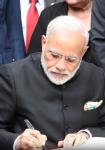Budgets are not what they used to be. In the past, Budget day was approached with a degree of fear and apprehension. There was a feeling of inevitability, impending doom.
With every Budget, not only would prices go up all round, the income tax rates would go up too. And sometimes, cruelty knew no bounds with the imposition of compulsory deposits.
Tax rates went up not just for what was home grown but also what was imported. If anyone thought there was a ceiling to import duties, beyond which it was not possible for them to go up, then he was proved silly during every Budget.
And after the Budget the blame game started. Shopkeepers blamed the price rise on the new Budget imposts.
Finance ministry spokesmen, on the other hand, were ready with their sums, showing how new taxes would add only an infinitesimal percentage to the price index. The rest of the rise was blamed on that universal villain, the profiteer.
There was just one other person even more hated than the profiteer -- it was the hoarder. He got to work long before the Budget and made everyone's life miserable by causing whatever little there was on shop shelves in normal times to disappear for several weeks.
If the profiteer sought to hit you with a single jab, the hoarder treated you to slow torture. The two roles were often performed by the same person but he came in different garbs and stages in the drama. Where the hoarder exited, the profiteer entered.
It was particularly frustrating for us young smokers. As Budget day approached, cigarettes would slowly start disappearing from paan shops. The local friendly paanwala tried to help you a little by fishing out a packet from under his other stuff when there was no one around and give it to you as a very special gesture.
But this stopped as the Budget got very near. We never imagined he himself was also a hoarder. That role was reserved for the nameless, faceless stockist or distributor.
The blame game for the price rise took peculiar turns. Taxes on local goods were bad, but somehow higher import duties were not so bad. After all, local industry had to be protected against the devilish multinationals and their produce.
Trouble arose when the prices of goods that were wholly locally produced also went up in response to import duty rises.
I remember a lively debate in our economics undergraduate class trying to figure out why the prices of vegetables went up in step with import duties.
A friend, given to theatrics, brought the house down by asking dramatically how many kilos of tomatoes India imported. In fact, rise in the retail prices of agricultural produce was particularly mystifying as every Budget speech took special care to explain that the farmer (his input costs) and the man in the street had been protected.
How times have changed was brought home to me when the other day my aged mother asked why I was not making one or two biggish purchases as the Budget was round to corner.
Prices would surely go up after the Budget, she said. Totally missing today is the pre-Budget buying mania to beat the taxman, with the devil taking the hindmost guy who has absolutely nothing in his pocket.
I can even recall the watershed when the change took place. The 1993 Budget was approaching and I was seriously considering selling my old Maruti car, which had seen better days.
Although it was a great car and the whole family loved it, the car clearly showed its age and I was prepare to settle for a modest sum.
But luck seemed to be on my side and I was eventually able to get rid of it for Rs 75,000, a princely sum for a car that had done over a lakh kilometres and whose engine had borne the brunt of the AC blowing full blast through more than half a dozen Delhi summers.
As I parted with the car and the buyer his money, I realised why the deal had worked so well for me. He thought he had made a fool of me as car prices would surely go up with the Budget, as they nearly always did.
But that was when Manmohanomics was getting into its stride and I suspected that life would not go on unchanged. I turned out to be right and cars actually became cheaper, courtesy the new style Budget, which sought to bring down tax rates.
The pre-Budget mood over the next several years was ambivalent. You didn't quite know if taxes would go down or simply stay put. More recently, the boot has been on the other foot.
Manufacturers, buffeted by competition and rising costs, have been telling buyers that they would not be able to hold prices after the Budget, come what may.
So this is your last chance to take advantage of the special discounts, they said. The pre-Budget price rise had been replaced by the pre-Diwali type discounts!
But even that phase has gone. This last Budget, nobody raised prices or offered discounts. The link between prices and the Budget is now totally gone.
Even within newspapers things have changed totally. Gone are the days of 5 p m Budgets, the mad rush to get stories out within a couple of hours and burning not the midnight but the early morning oil to put the paper to bed.
Not only is it now a late morning Budget, the voluminous Budget documents are all on the net not long after the Budget speech is over. The latest grouse is too many hits jamming the server which hosts the website that posts the Budget papers.
But the way the processing power of servers and bandwidth are growing, even these complaints will be gone. Then the Budget as an event will become a total non-event.






